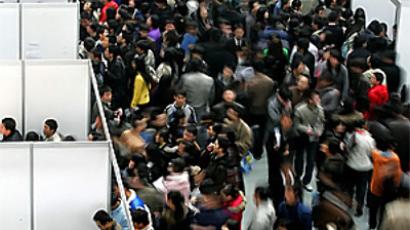Socialism: A solution to America’s recession
When polled a number of Americans like the essence of many socialist ideas, but fear the term "socialism" itself.
The poll conducted in 2005 eluded to the idea that many Americans favored a system similar to the Swedish governance model.
Michael Prysner of the Party for Socialism and Liberation said that socialism is scary and dangerous only to the top one percent of America’s wealthy, because it aims to help those who are not as well off but work to create the wealth.
Whereas, Nicki Kurokawa, the director of research analysis at The Winston Group in Washington, DC said the aforementioned poll of Americans actually showed that Americans favored more income equality, not socialism.
“Six out of ten Americans, according to a 2010 January Gallup poll, actually have an unfavorable opinion of socialism. So, it’s more than just that top one percent,” said Kurokawa.
She said that Americans understand what socialism is, and have said in polls they favor small businesses, entrepreneurship and capitalism.
Kurokawa explained that the 2005 poll was not well designed. It was an online poll that asked people to pick which system they would prefer to live based on three pie charts – a chart divided equally, one similar to the Swedish model and one based on the US system. Respondents were asked to pick the chart they would prefer to be placed in if they were randomly pleased as either poor or rich into any of the systems. This is different from asking people to say which system they prefer overall, said Kurokawa.
“If we go back to and we asked people, would you prefer to live in a society where your top income bracket is 60 percent, you face a 25 percent VAT and your average take-home pay is $13,000 vs. a system where your income tax top bracket is 35 percent, there is no VAT and your average take-home pay is $20,000, which would you prefer? That’s a much different question,” she said.
Prysner argued that it is irrelevant to question the validity of the poll.
“We’re living in a time now where so many people are becoming unemployed; this so-called economic recovery is still yielding job losses every single month, record foreclosures, where the country where the number one cause of bankruptcy is from hospital bills, and the majority of those people have health insurance,” said Prysner.
He argued that crops are being burned to the ground and pharmaceuticals destroyed to maintain high prices.
“This is a completely absurd system,” he said.
He argued the poll shows that Americans have recognized a great divide between the rich and the poor and that the rich are squandering the wealth on wars and other expenses.
“The capitalist system simply does not work, not only does it not work but it is completely absurd, cruel and inhumane system,” said Prysner.
Kurokawa argued that the contrary is true; government intervention, or socialism, doesn’t work.
“What was the reason that we stockpiled all those flu vaccines last year? It was the government. The government ordered that. The government, through its farm subsidies, ends up paying farmers more than their crops actually are worth. So, I would point to the fact that actually government intervention doesn’t work,” said Kurokawa.
She said the American people are in fact not comfortable with increased government intervention.
“Rasmussen Reports did a poll in September 2010 and they asked; would you prefer a larger government that offers more services or a smaller government with lower taxes that offers fewer services, and 70 percent of respondents said they would prefer a smaller government,” said Kurokawa.
Internationally, an Economist/BBC poll showed that people preferred lower taxes and less services than higher taxes and more services, explained Kurokawa, also citing Fidel Castro's recent statement regarding the failing system in Cuba.
Prysner however argued that the free market has failed, that large scale government intervention is the only thing supporting the system currently.
He argued that it is obvious that large scale government intervention is the only thing supporting the system, but that that support should actually direct its efforts to helping the people in need, not helping the rich or going towards funding wars overseas.














